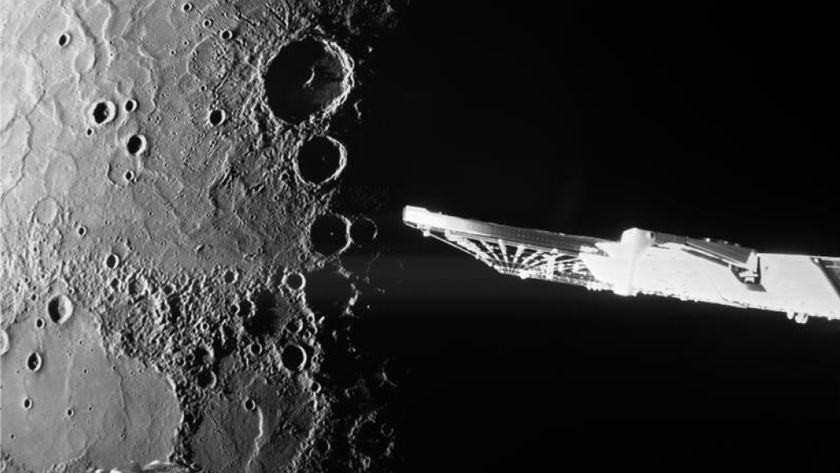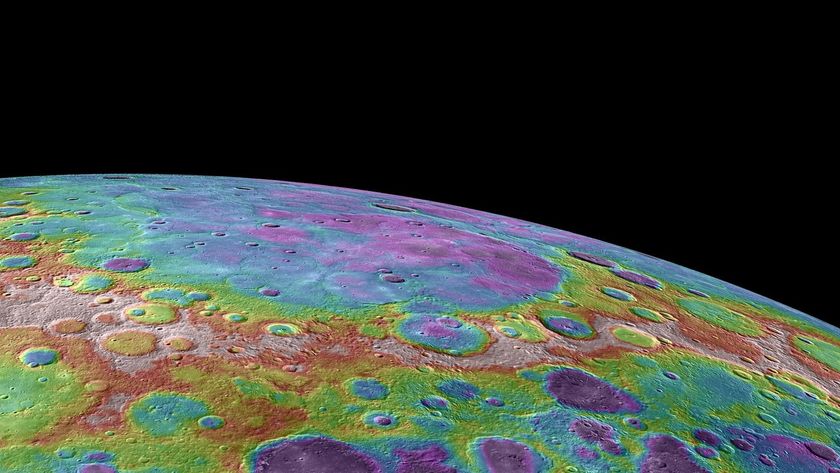NASA Spots Mysterious 'Spider' on Mercury
A whole new side of Mercury has been revealed in pictures taken by NASA's MESSENGER probe, which flew by the tiny planet two weeks ago in the first mission to Mercury in more than three decades.
MESSENGER skimmed only 124 miles (200 kilometers) over Mercury's surface on Jan. 14, in the first of three passes it will make before settling into orbit March 18, 2011.
The photos, released today, include one of a feature the scientists informally call "the spider," which appears to be an impact crater surrounded by more than 50 cracks in the surface radiating from its center.
Scientists are perplexed by this structure, which is unlike anything observed elsewhere in the solar system.
"It's a real mystery, a very unexpected find," said Louise Prockter, an instrument scientist at the Johns Hopkins University Applied Physics Laboratory, which built the probe for the $446 million NASA mission. She said whatever event created the spider "is anybody's guess," but suggested perhaps a volcanic intrusion beneath the planet's surface led to the formation of the troughs.
The last time NASA sent a probe to Mercury was in 1975, when the Mariner 10 spacecraft flew by the planet three times. MESSENGER'S first flyby gave scientists the first glimpses of Mercury's hidden side, the 55 percent of its surface that was left uncharted by Mariner 10.
MESSENGER, short for MErcury Surface, Space ENvironment, GEochemistry, and Ranging, also measured another peculiar element of Mercury — its magnetic field. Earth has a magnetic field surrounding it that acts as a protective bubble shielding the surface from cosmic rays and solar storms. But scientists were shocked when Mariner 10 discovered a magnetic field at Mercury, too.
Sign up for the Live Science daily newsletter now
Get the world’s most fascinating discoveries delivered straight to your inbox.
"The only other example in our solar system of an Earth-like magnetosphere is tiny Mercury," said Sean C. Solomon, MESSENGER Principal Investigator from the Carnegie Institution of Washington.
MESSENGER was able to fly through the magnetic field and take detailed measurements that scientists hope to use to discover the origins of the inexplicable magnetosphere.
Scientists have been poring over more than 1,200 new images sent by seven instruments on the probe, and they are excited to gain new insight into the composition of Mercury's surface, the planet's history, and where its atmosphere comes from.
"On the eve of the encounter I couldn?t sleep at all," said Robert Strom, a MESSENGER science team member who also worked on the Mariner 10 mission. "I've waited 30 years for this. It didn?t disappoint at all. I was astounded at the quality of these images. It dawned on me that this is a whole new planet that we're looking at."
The satellite will further probe Mercury's mysteries in a second pass over the planet in October, followed by a third flyby in September 2009.
The probe has traveled 4.9 billion miles (7.9 billion-kilometers) since it launched in August 2004. On its journey it soared by Earth once and Venus twice, offering gorgeous views of these planets as well. In 2011 MESSENGER will become the first spacecraft to orbit the closest planet to the Sun.












